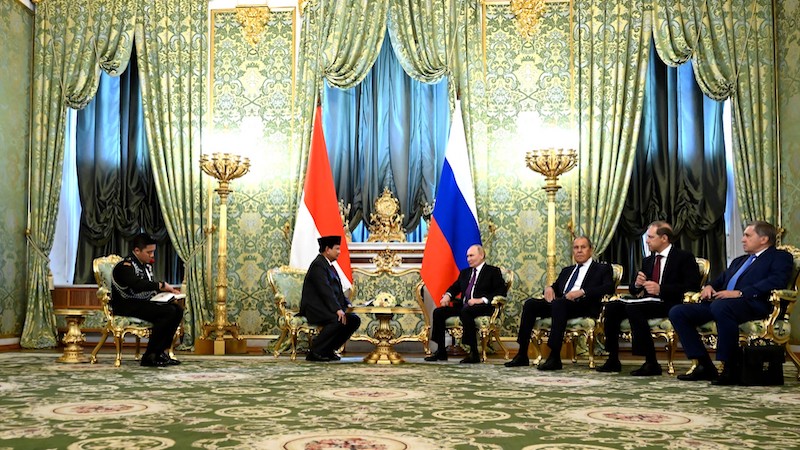
By Pieter Pandie
Since his win in Indonesia’s presidential election, Prabowo Subianto has been busy. Beyond engaging with constituents at home, the president-elect also made a series of international trips — including to Moscow, where he met Russian President Vladimir Putin and Secretary of the Security Council Sergei Shogu. What does this visit reveal about Indonesia’s foreign policy under Prabowo’s incoming administration?
In official statements by Indonesia’s Ministry of Defence, Prabowofocused on discussingincreased cooperation on various fields such as defence, energy, education, tourism and food security. Prabowo emphasised his desire to strengthen the Indonesian defence industry through Russian technology transfers and to open avenues for Indonesian military personnel to study in Russia.
Prabowo alsoinvited Russiato send a delegation to Indonesia’s biannual defence conference and exhibition, invited Russia to participate in Indonesia’s naval parade and promised to send a navy contingent to the next Russian Navy Day Parade if possible. Putin emphasised he was verypleased to seeeconomic and trade ties have developed well, despite the COVID-19 pandemic and Western sanctions against Russia.
Prabowo’s visit presents a major opportunity for Russia to avoid further international isolation. Russia’s war in Ukraine has led to widespread condemnation andheavy sanctionsfrom the United States. Moscow has instead leaned on its ties with ‘non-aligned’ states such asIndiaandVietnam, in addition to ties with existing partners such asChina. Prabowo’s visit, as well as the significant strategic value that Indonesia brings to the table, comes at a convenient time for Putin.
Prabowo is keeping consistent with how Indonesia has previously pursued its international relations. On the surface, this visit is consistent with Prabowo’s so-called ‘Good Neighbour Policy’, where he imagines Indonesia to be a state open to relations with any friendly country. Beyond such narratives lie a common theme in Indonesian foreign policy — to place Indonesia in the ‘middle’ of several global affairs, seeking to avoid aligning itself too closely with any major power while attempting to maximise its own gains.
Prabowo’s desire for greater ties with Moscow and Indonesia’s comparatively neutral response to Russia’s war in Ukraine — particularly compared to its response to the ongoing crisis in Gaza — reflects Indonesia’s continued commitment to stay in the ‘middle’ of global affairs. It favours keeping its doors open for future cooperation and pursuing its own national interests. This was shown in outgoing Indonesian president Joko Widodo’s visits to both Kiev and Moscow in 2022 — whileinitially framedas an attempt at conflict mediation, they were more aboutsecuring wheat and fertiliser exportsto Indonesia amid rising global food prices.
This is also reflected in Indonesia’s official responses and UN voting records when it comes to Russia. Indonesiarefused to signthe final communique of the Ukraine Peace Summit in 2024 due to Russia’s absence and the forum’s apparent lack of ‘inclusivity and balance’, and hasavoided naming Russiaas the aggressor in Ukraine.
Yet Indonesia voted in favour of the UN General Assembly’s resolution tocondemn Russian annexationof Ukrainian territories in 2022. Prabowo’s ‘Good Neighbour’ policy is a continuation of that trend of staying in the middle, where Jakarta willavoid siding too closelywith any great power and pursue cooperation with all regardless of ideological leanings.
While Prabowo has expressed his interest in strengthening ties with Russia, Jakarta will not pursue relations to the extent that it jeopardises itsrelationship with the United Statesand its Western partners. Indonesia’s stance and continued relationship with Russia should not be interpreted as tilting to Russia more than the West, but rather that Indonesia sees certain opportunities for pursuing its own national interest.
Western sanctions, while aimed at Russia, haveindirect consequencesfor Indonesia’s energy and food security as well. It is not surprising that Indonesia hasflirted with the ideaof capitalising on purchasing Russian oil due to the potential bargain it could score because of Western price caps, given rising oil prices globally.
Even so, policymakers in Jakarta understand well the risks of aligning too closely with Russia, as displayed in Indonesia’swithdrawal from purchasingRussian Sukhoi fighter jets due to fears of US sanctions. Western countries, including the United States, remain important partners for Indonesia, and it is unlikely it will risk harming such relations for short-term gains.
Prabowo’s visit to Russia and his supposed ‘Good Neighbour’ policy signals that Indonesia will continue to walk an increasingly thin tightrope as it seeks to reap the benefits from engaging with competing global powers. As it struggles with various domestic challenges amid pursuing its goal ofbecoming a developed countryby 2045, Indonesia will likely continue to pursue apragmatic approachin its international relations under the incoming Prabowo administration. This approach is one guided by national interest, cooperation and mutual benefit — and less on specific norms and values.
- About the author: Pieter Pandie is a Researcher at the Department of International Relations, Centre for Strategic and International Studies (CSIS).
- Source: This article was published by East Asia Forum